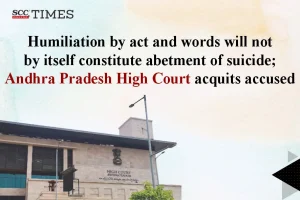Andhra Pradesh High Court: A criminal revision petition was filed by the petitioners challenging their conviction under Section 306 of Penal Code, 1860, (IPC) for abetting the suicide of the wife of petitioner 1. Lakhshmana Rao, J., acquitted the petitioners as the conviction of the petitioners under Section 306 IPC was not sustainable in law on grounds due to evidence failing to establish the requisite mens rea or any direct/proximate instigation to commit suicide.
The background to the case involves a deeply strained marital relationship between petitioner 1 and his wife, with ongoing physical and mental harassment rooted in suspicion of the deceased’s fidelity. The prosecution case alleged that on the night of 14-02-2008, the deceased was beaten by both petitioners, including being struck with a chappal by petitioner 2. Thus, being humiliated by the assault and verbal abuse, she poured kerosene over herself and set herself on fire. She was shifted to the Government Hospital at Nandigama and later to Vijayawada General Hospital, where she succumbed to burn injuries the following day.
The case hinged substantially on the dying-declaration of the deceased recorded by the Judicial Magistrate, and another statement recorded by the Sub-Inspector of Police. However, significant discrepancies emerged in the timings and circumstances of these recordings. While the Magistrate claimed to have recorded the dying declaration between 10:45 a.m. and 10:55 a.m. in the presence of a duty doctor and attender, the Sub-Inspector testified that he recorded the statement between 10:50 a.m. and 11:00 a.m., raising serious doubts about the credibility of the evidence.
The trial court convicted the petitioners solely on the basis of the dying declaration, despite the fact that key eyewitnesses (PWs 1 to 4) turned hostile and the attending doctor, whose testimony would have been critical in proving the mental fitness of the deceased at the time of making the statement, was not examined. The post-mortem report revealed 100% burn injuries, further questioning the plausibility of a coherent dying declaration.
The conviction originally recorded by the Assistant Sessions Judge was affirmed on appeal by the VI Additional District and Sessions Judge (Fast Track Court), Krishna, Machilipatnam in criminal appeal. The petitioner was sentenced to four years of rigorous imprisonment with a fine of Rs. 500 each, and in default, simple imprisonment for three months.
The Court carefully analysed the evidentiary matrix and the judicial precedents governing Section 306 IPC. Relying on a catena of Supreme Court decisions including S.S. Chheena v. Vijay Kumar Mahajan, (2010) 1 SCC 707, Amalendu Pal v. State of West Bengal, (2010) 1 SCC 707, M. Mohan v. State, (2011) 3 SCC 626 and more recent authoritative pronouncements such as Mahendra Awase v. State of M.P., 2025 SCC OnLine SC 107 and Nipun Aneja v. State of U.P., 2024 SCC OnLine SC 4091 the Court reiterated the principle that abetment of suicide demands more than general harassment. It must involve a direct or proximate act of instigation or aid, accompanied by clear mens rea. The conduct must have actively created a situation where the victim felt suicide was the only escape.
The Court remarked that There was no evidence that “the petitioners instigated X to commit suicide. There was no evidence to the effect that the petitioners either goaded or provoked or instigated or encouraged her to commit suicide. Therefore, it may not be right to hold that the petitioners were guilty of abetment of suicide. The deceased felt insulted or humiliated as her brother-in-law and husband beat her on the pretext that she had not kept her matrimonial piousness. The action of the Petitioners is otherwise not ordinarily expected to induce similarly circumstanced person to commit suicide, the deceased was hypersensitive, as such, it would not be appropriate and proper to convict the Petitioners for abetment of suicide”
The Court held that the incident of assault, though reprehensible, was a one-off episode and could not, by itself, be construed as abetment. There was no evidence of sustained harassment or a proximate act of incitement that pushed the deceased into committing suicide. The mere utterance by the petitioners asking her why she should continue living, while abusive, did not fulfill the legal threshold for instigation under Section 107 IPC, which is a prerequisite for a conviction under Section 306 IPC. Moreover, the lack of medical testimony and contradictions in recording the dying declaration made the prosecution case unreliable.
Accordingly, the Court allowed the criminal revision petition, set aside the conviction and sentences passed by both the trial and appellate courts, and acquitted the petitioners of all charges. The Court also highlighted the need for cautious application of Section 306 IPC by both investigating agencies and subordinate courts, to prevent misuse and miscarriage of justice.
[Chilikuri Mariyadas v. State of AP, 2025 SCC OnLine AP 2379, decided on 16-06-2025]
Counsel for the Petitioners: Sri P. Prabhakara Rao
Counsel for the Respondent: Ms. P. Akhila Naidu, Assistant Public Prosecutor


